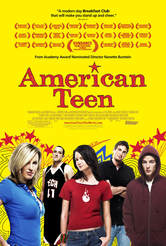|
As your child enters middle school, junior high, or high school, it can get especially difficult for you as a parent to help with social skills. This can be a problem because older kids are dealing with a more complex social environment than they were when they were younger, and many kids who managed in the early school years really start to struggle as they get older. One problem is that parents of older kids just aren’t as involved with the school as they used to be. There’s less of an opportunity to volunteer, your kids may no longer want parents around, the kids are coming from a larger geographic area, the school is bigger, there are multiple teachers who may not really know your teenager. For many reasons, it may seem as if you are sending your child off into unknown territory to manage academically and socially, and you can’t understand that world. That’s why movies, books, or TV can be a useful communication tool for kids and parents. You can watch or read together, enter the same world together, and use that as a way to understand what your child goes through every day. From there, you can help your child figure out and manage all the subtle social things that go on at school every day. One movie that’s very useful for this purpose is the 2008 Sundance film American Teen. American Teen is a documentary about the 2005 graduation class of tiny, rural Warsaw, Indiana. This film doesn’t tackle the larger issues that may be impacting many teens. There no talk of gangs or violence, and little mention of multicultural issues, drugs, and all the heavy problems facing today’s teens. Instead this film focuses on the same universal issues that teenagers have been dealing with for generations, namely friendships, young love, bullying, and pressure. Peer pressure, social pressure, academic and athletic pressure, pressure from parents, and maybe the biggest pressure of all, that universal concern about what’s going to happen after graduation.
As a first step, go watch this film with your son or daughter. It’s rated PG-13, and contains themes and language some parents may object to. Kids-in-Mind, (http://www.kids-in-mind.com/a/americanteen.htm), a very useful movie rating website that ranks movies on a scale of 1 to 10 in three categories, Sex and Nudity, Violence and Gore, and Profanity, has given American Teen a score of 3-4-5. (If you’re not comfortable seeing this film with your kids, consider watching it yourself to get back in touch with those memories of high school pressures, cliques and the really cruel way kids can behave. But remember, your kids’ daily world at school would probably be rated at least a PG-13 as well.) Many teens who struggle with social skills aren’t very skillful at analyzing the social landscape of their school. That’s one area where this movie can help. All the standard high school stereotypes are represented here: the popular girl, the jock, the outcast, the prom king, the emotional girl. These may be stereotypes, but that doesn’t mean they’re not real, or that these kids don’t exist at your child’s school. It really eases basic social navigation if your child can figure out who plays these roles at his school. Then some of the “rules” become clearer, things like: just because a teen is popular doesn’t mean she’s nice, there’s a lot of pressure to date within your own clique, kids aren’t necessarily nice to their own friends. See if you can come up with your own list of some of the rules at your teenager’s school. How is the film school different from your teen's? On a more advanced level, this film will allow your teen to view peers with a more balanced vision. At school, you really don’t know why somebody is treating you badly, because you can’t understand the other side of the story. Because this film shows what’s going on for many kids, your teen can get a different perspective. See if you can move beyond the broad strikes. Are the class winners under pressure too? Do bad things happen to them also? Is the outcast left out because he's a bad guy? Learning to view everyone as a full human being, with strengths and weaknesses, triumphs and failures, goes a long way toward developing more mature social skills. One character in the film is a self proclaimed social outcast. He makes a real effort throughout the film to connect socially, especially with girls. Watching his awkward yet sincere attempts at relationships should give you and your teen plenty of material for discussion. What did he do well, and where did he fumble the situation? Are there times he wasn’t very attuned to his partner? Finally, just use this film to empathize with your teen’s situation. It seems like everyone in the film is struggling and even the most popular kids are not having a great time. Everyone, even the school’s basketball god, has to deal with the same issues about moving on from high school. Your child spends hours every day dealing with the pressures of school. A few hours with this movie will help you remember what that's like. Comments are closed.
|
Patricia Robinson MFT
I'm a licensed therapist in Danville, California and a coach for Asperger's and ADHD nationwide. I work with individuals of all ages who have special needs, like Autism Spectrum Disorders, ADD, ADHD, and the family members and partners of special needs individuals. Archives
February 2015
Categories
All
|


 RSS Feed
RSS Feed